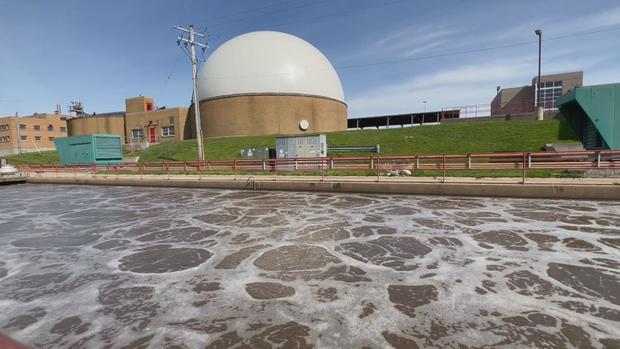Could wastewater power electric cars in the future? Oakland County says yes
PONTIAC, Mich. (CBS DETROIT) – Could flushing your toilet help power electric vehicles?
Well, that's something the sewage treatment facility in Pontiac aims to do. They're using some special technology that in the near future could replace the fossil fuels they use to run the plant and perhaps generate electricity for EVs.
"The water, sewer, stormwater sector uses about 4% of all the electricity in America, and instead of using it, we can start producing it," said Jim Nash, Water Resources Commissioner for Oakland County.
It was one of Oakland County's goals when they took over the former Pontiac Wastewater Treatment Plant a few years ago, now named the Clinton River Water Resource Recovery Facility. At the time, it was in rough shape.
"The odors were really bad, we were bringing a lot of solids, and we weren't able to process them," Michael Daniels, plant manager at Clinton River Water Resource Recovery Facility, said.
So once they secured funding, the facility that pumps 20 million gallons of treated water into the Clinton River each day saw some significant upgrades.
One of them captures methane gas.
"This is all methane created in an airtight environment. So it's not leaking into the atmosphere like it does when it's fossil fuels coming out of the ground," Nash said.
It's done through a unique process called Thermal Hydrolysis Pretreatment, or THP for short. It breaks down the cell walls from waste so the facility's bacteria can turn it into methane and fertilizer.
The plant is already using the methane to operate some equipment, but they want to take it to the next level.
"We're looking at another process that, again, we'd be the first in the country to use this process. It's a bacteria that only can function, that only can live in very high-temperature waters just below the boiling point. So we can use that in a way that's going to be able to make it even more efficient to break down these solids," Nash said.
"Which, in return, gives us more Bio-gas, and that would probably give us up near 400,000 cubic feet per day, which also we would use to run the cogent units, and those cogent units would produce electricity to take us off of the grid," Daniels said.
The county is currently looking for grants to help fund that form of renewable energy.





